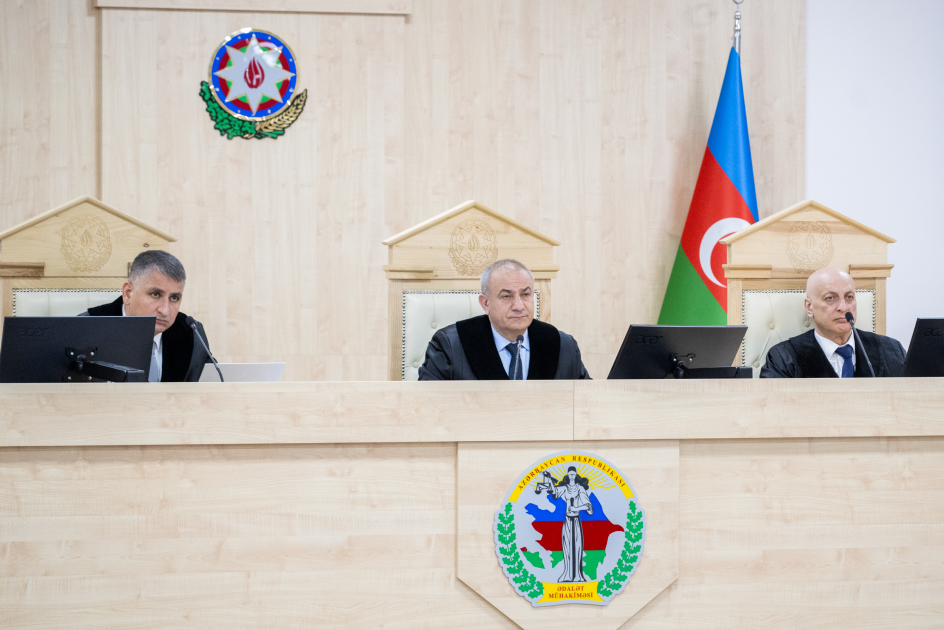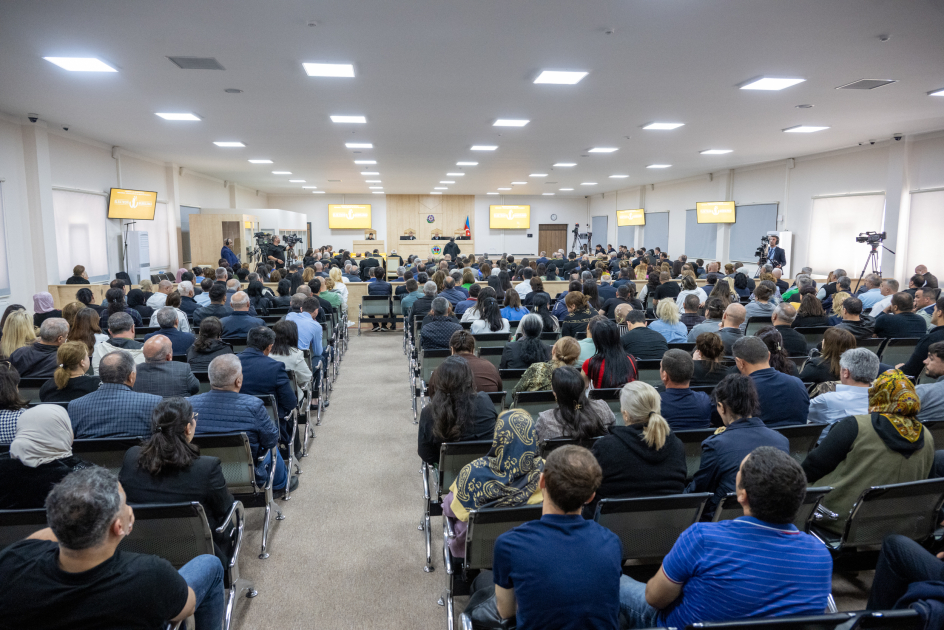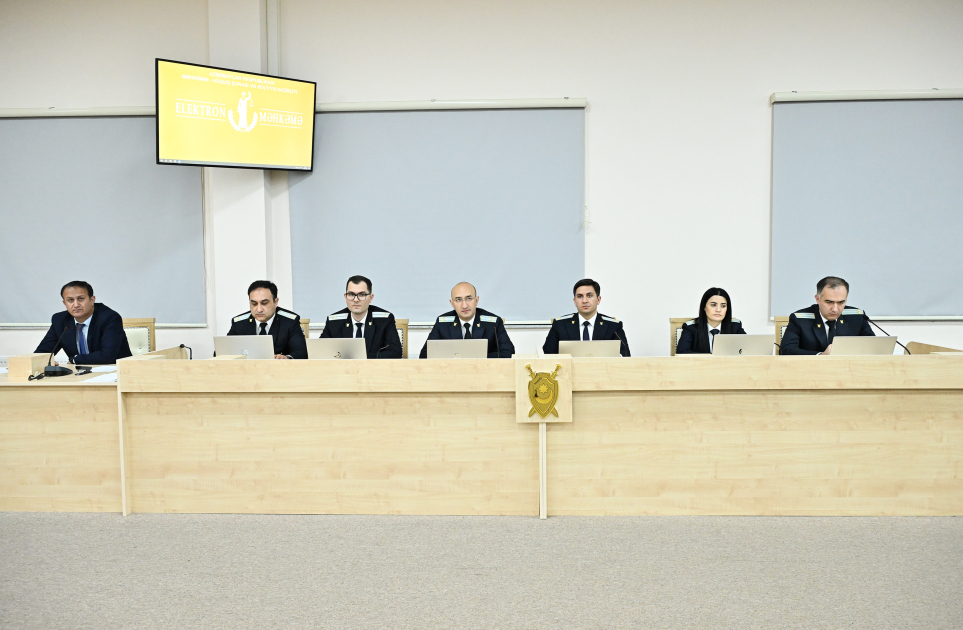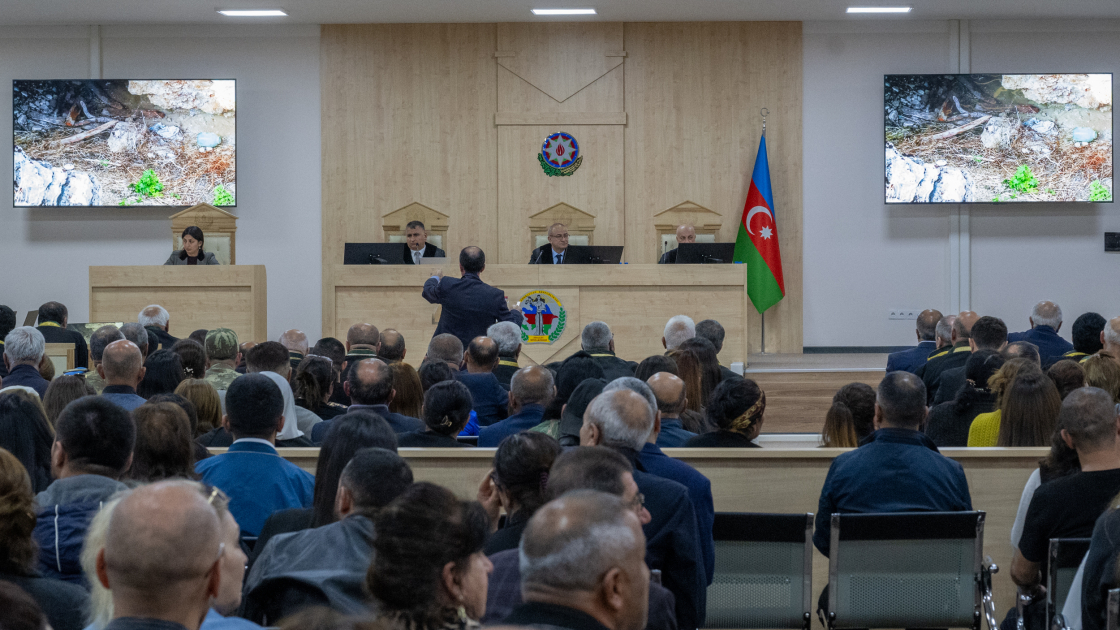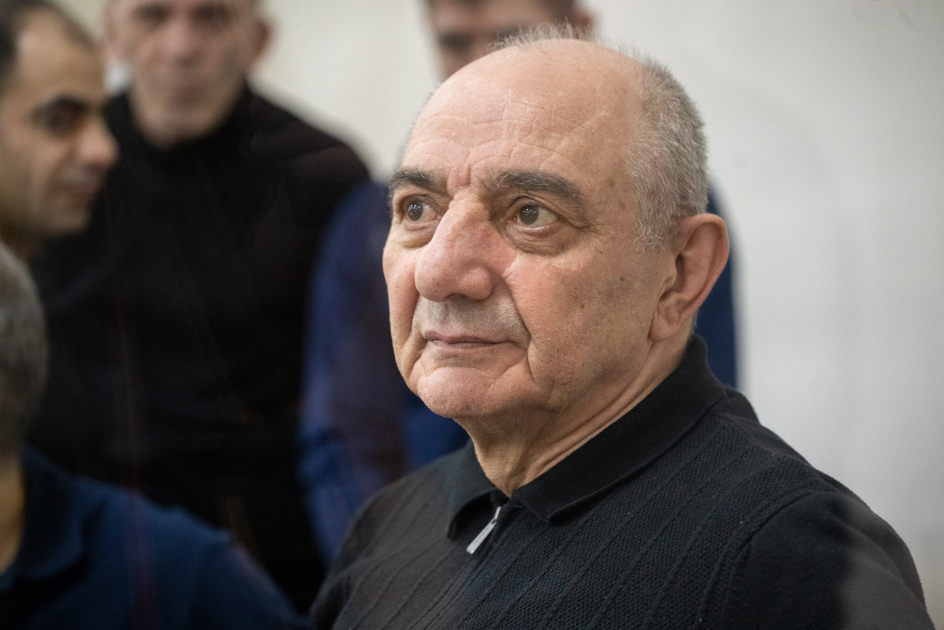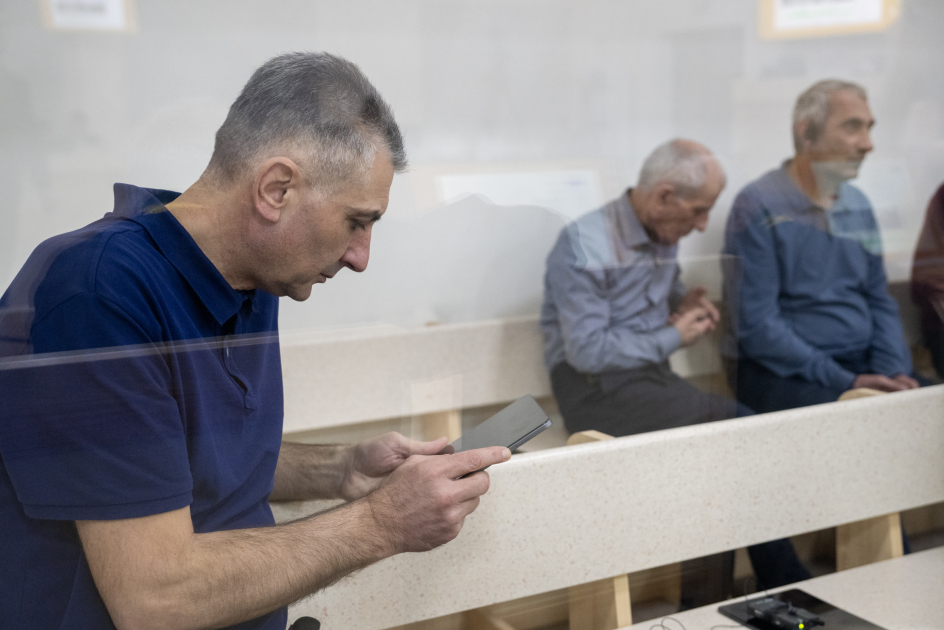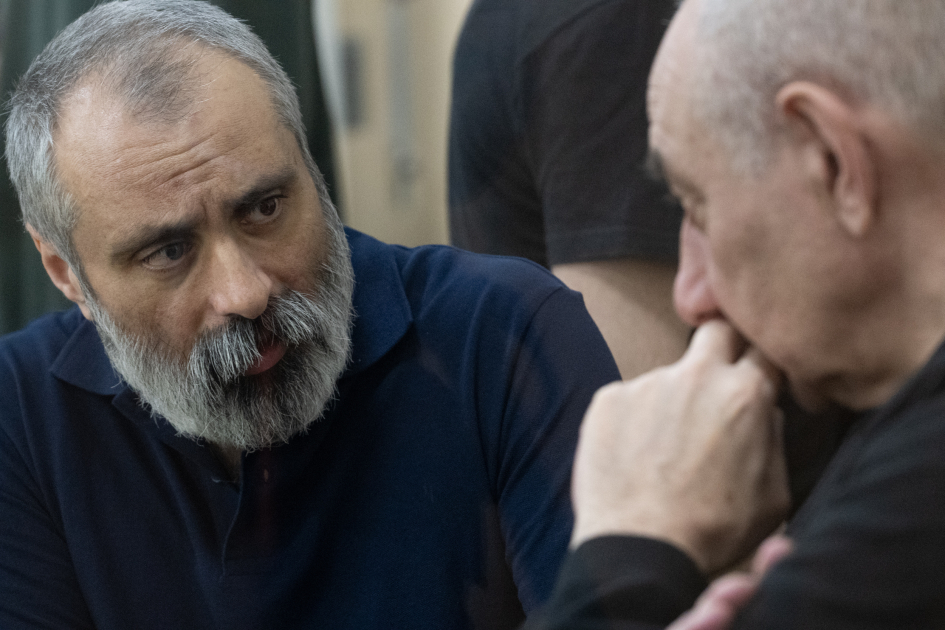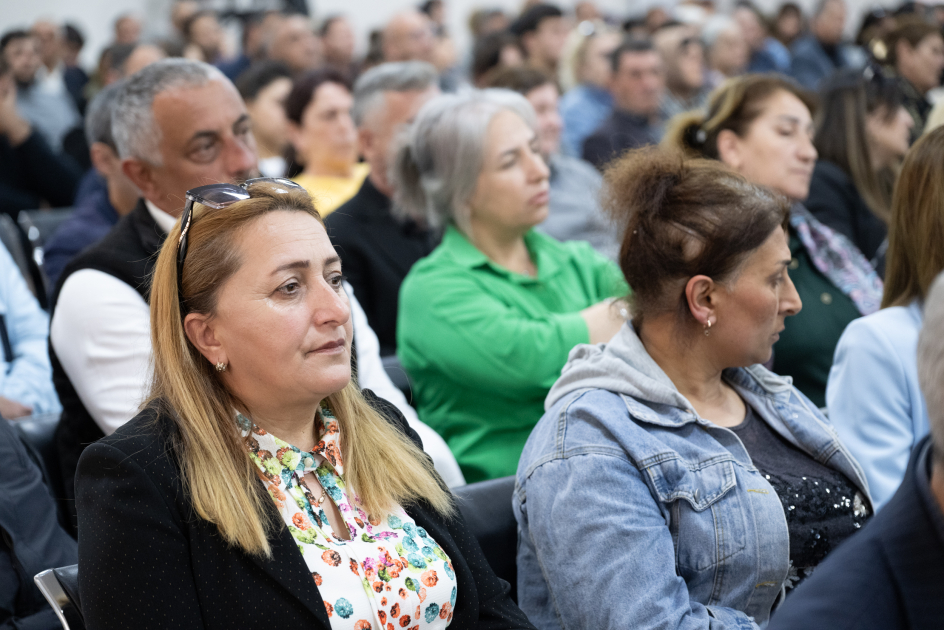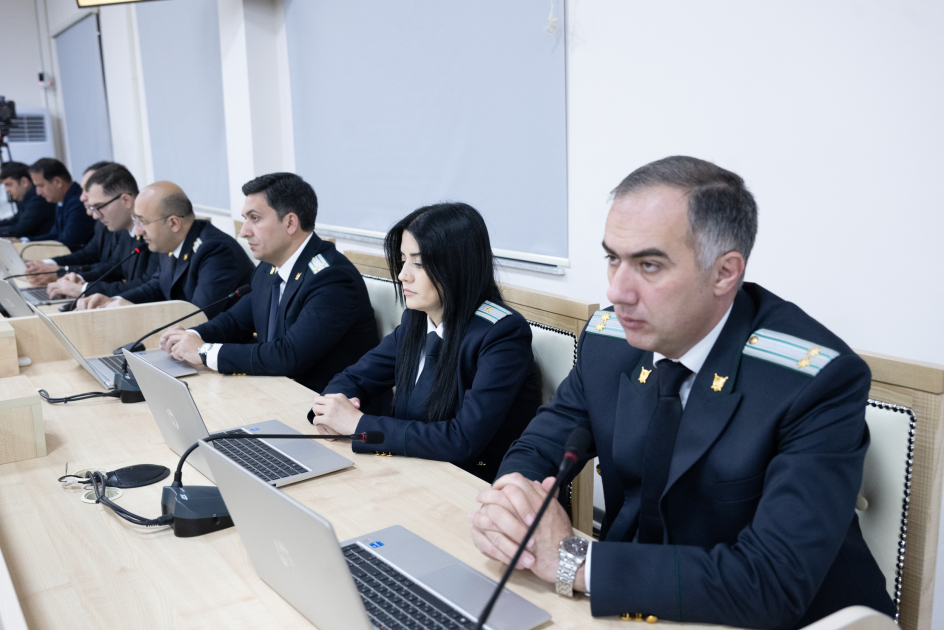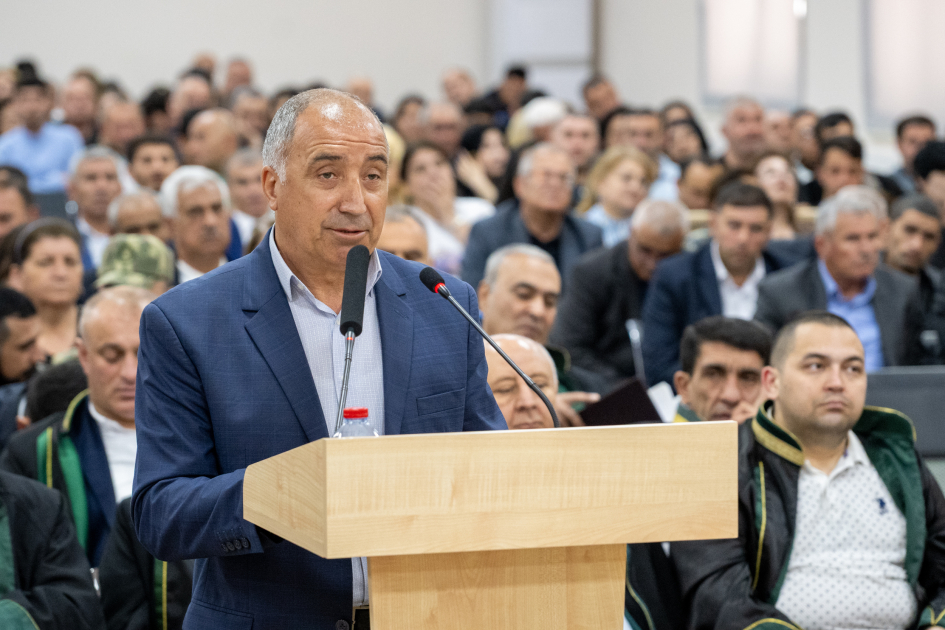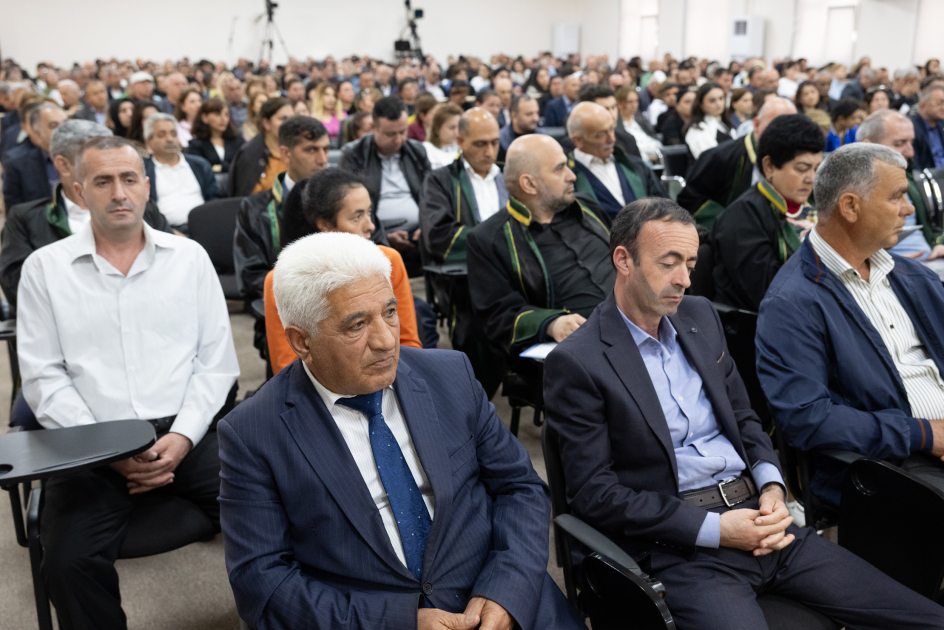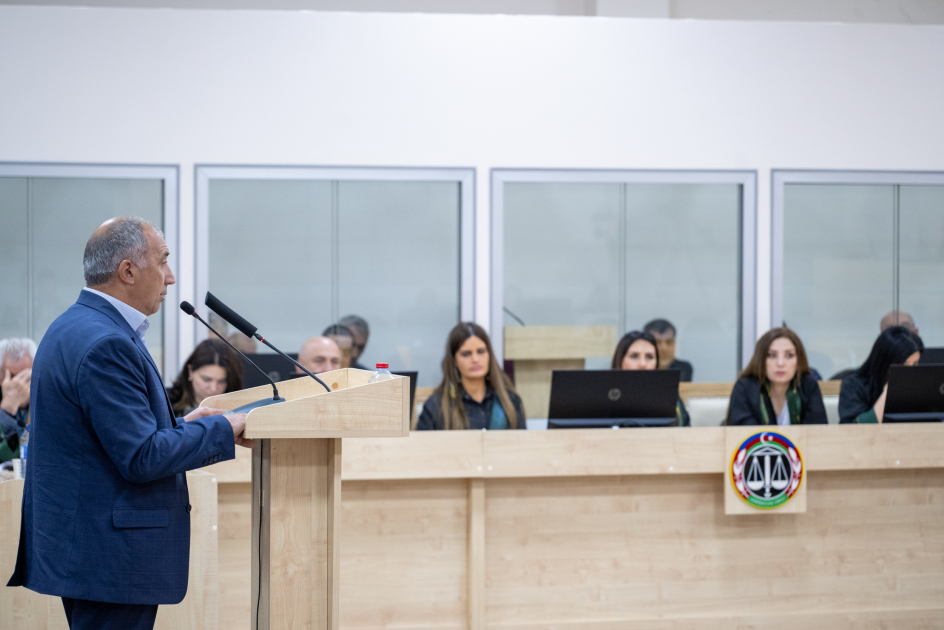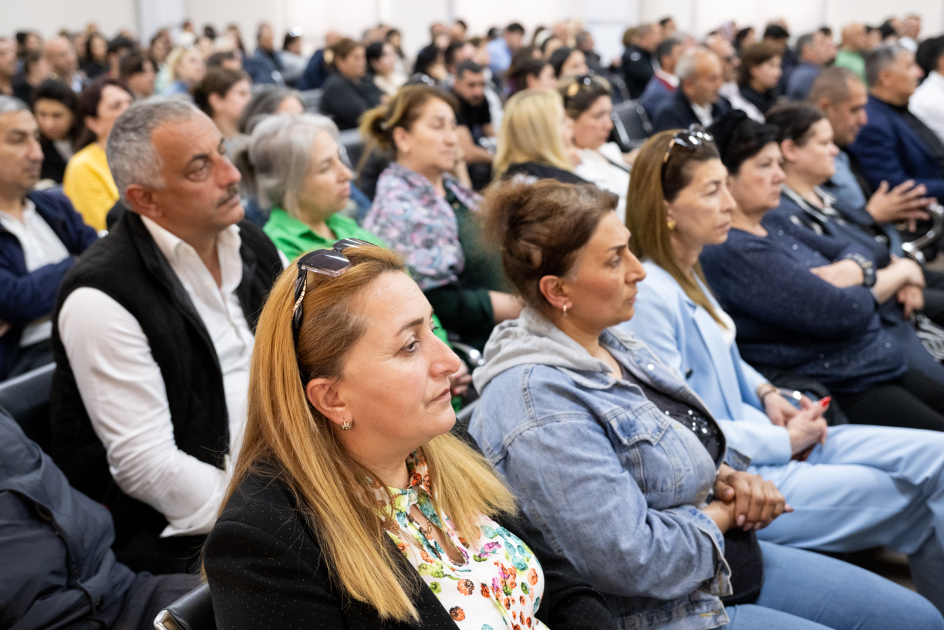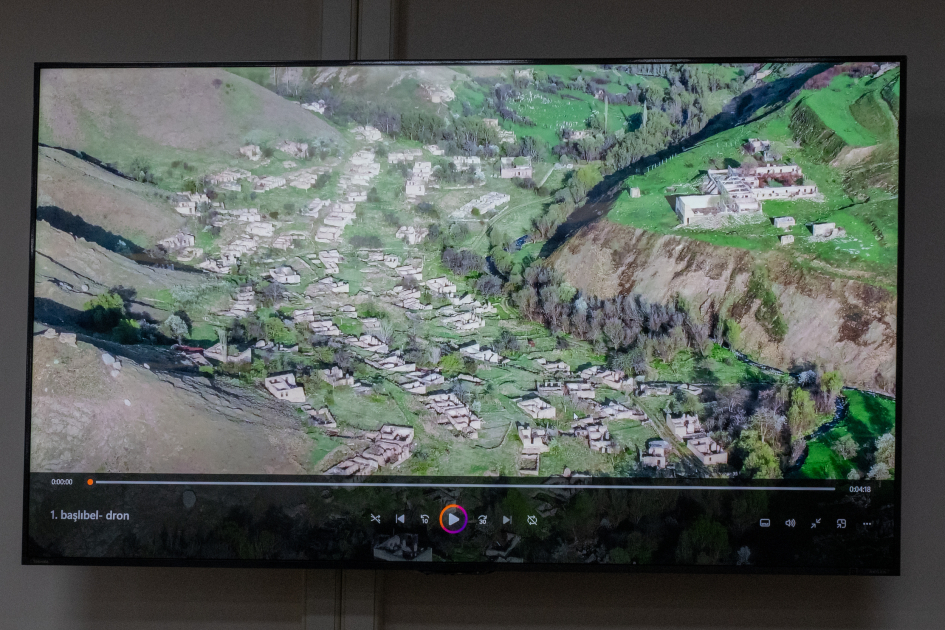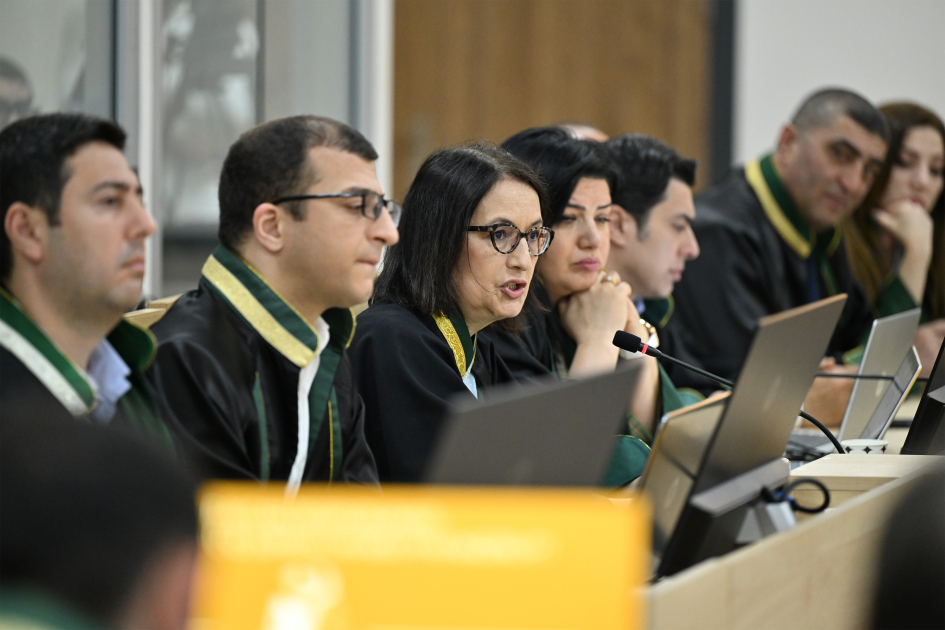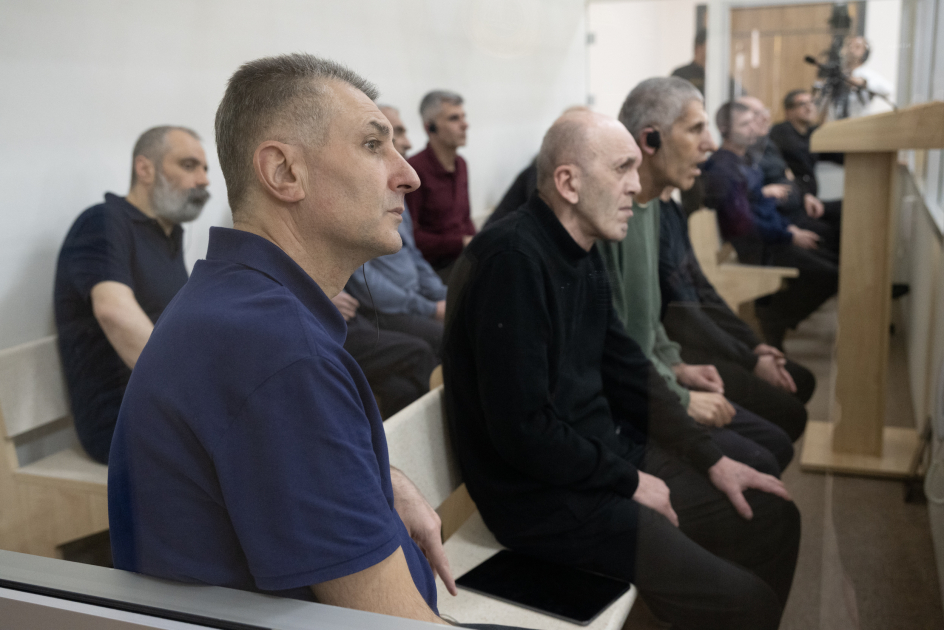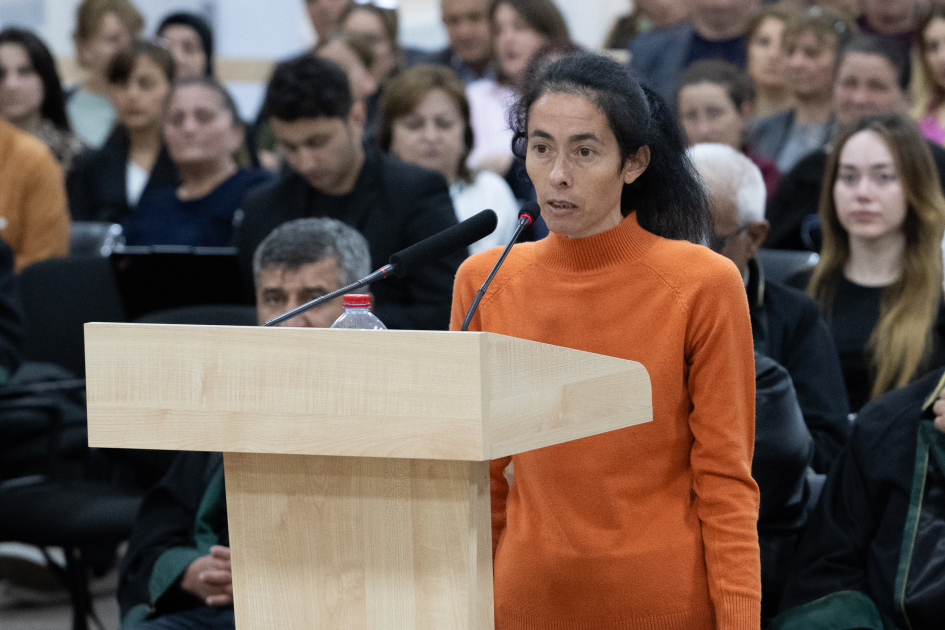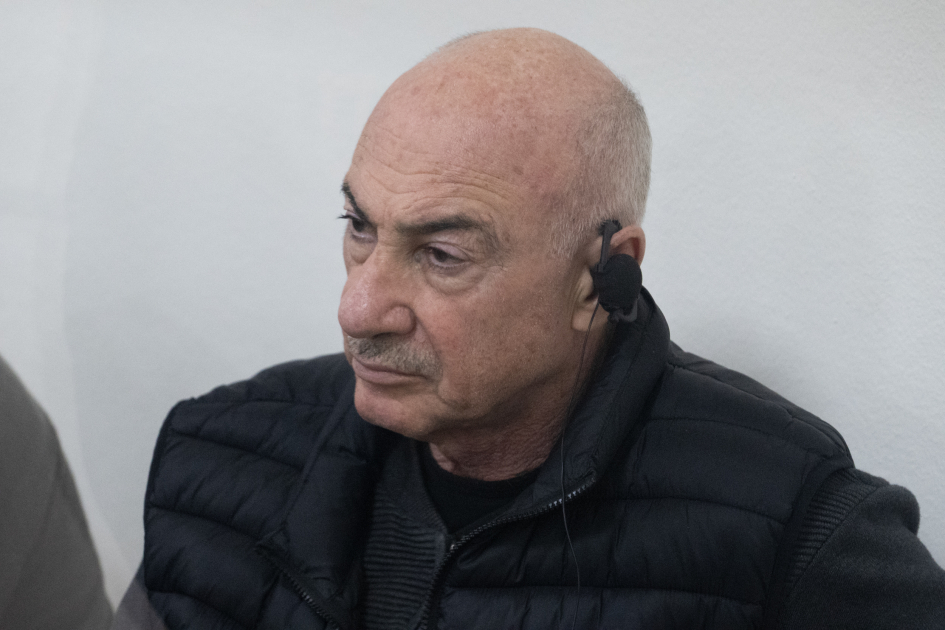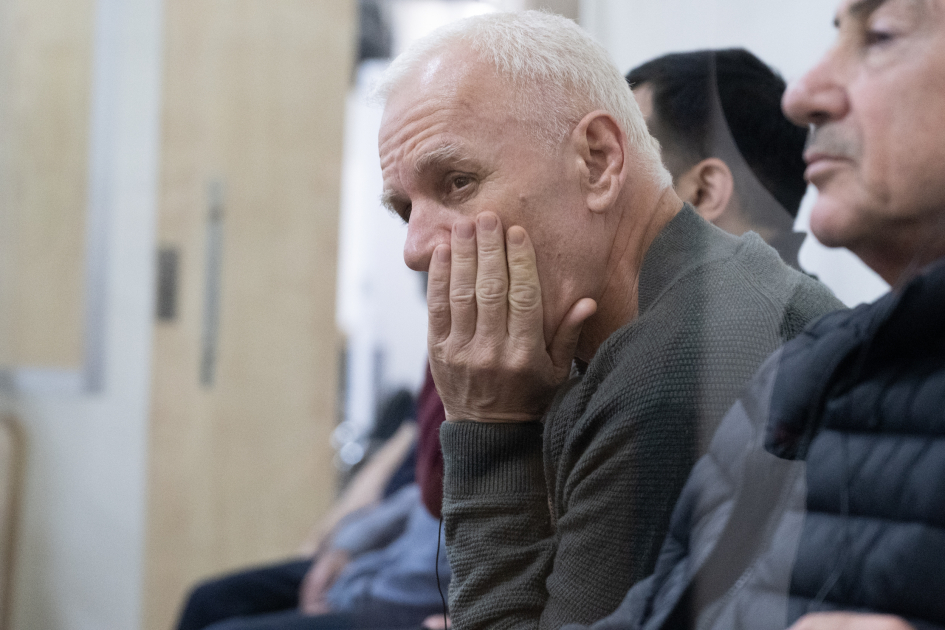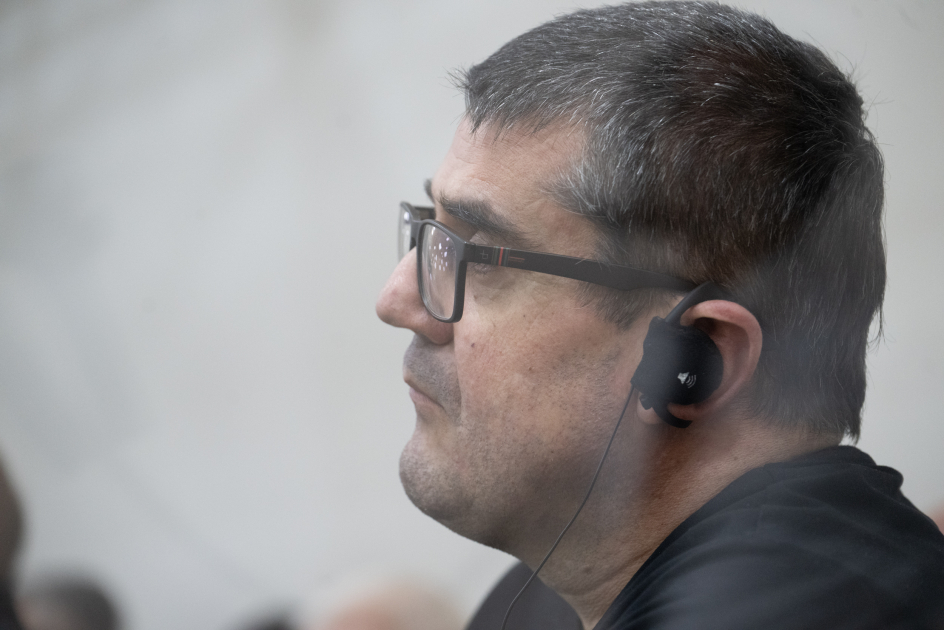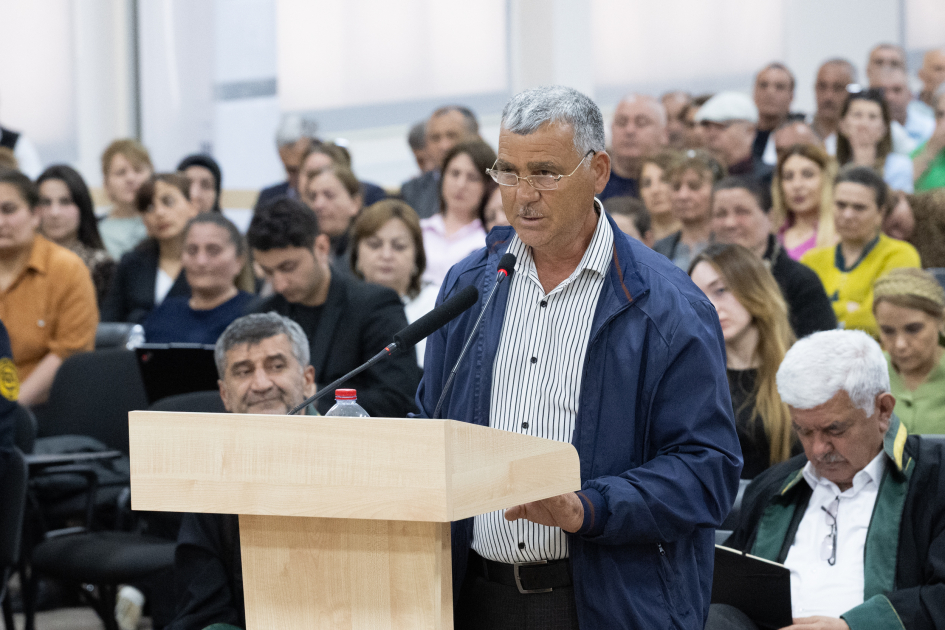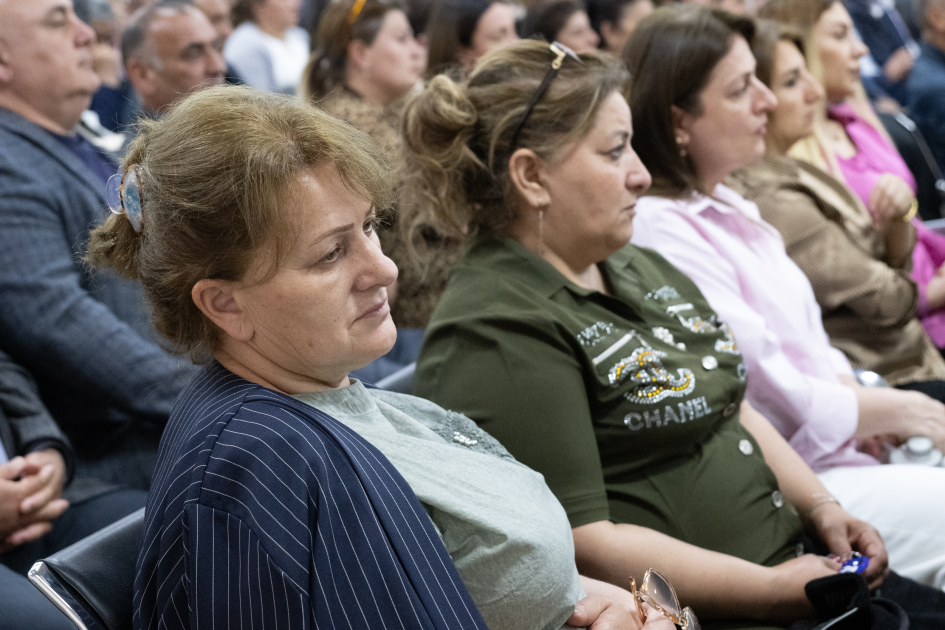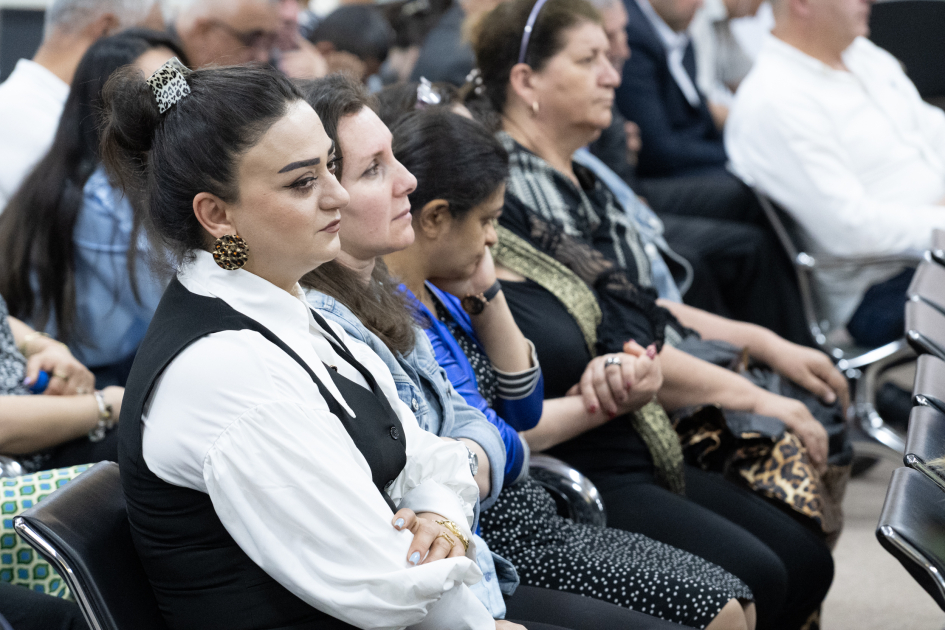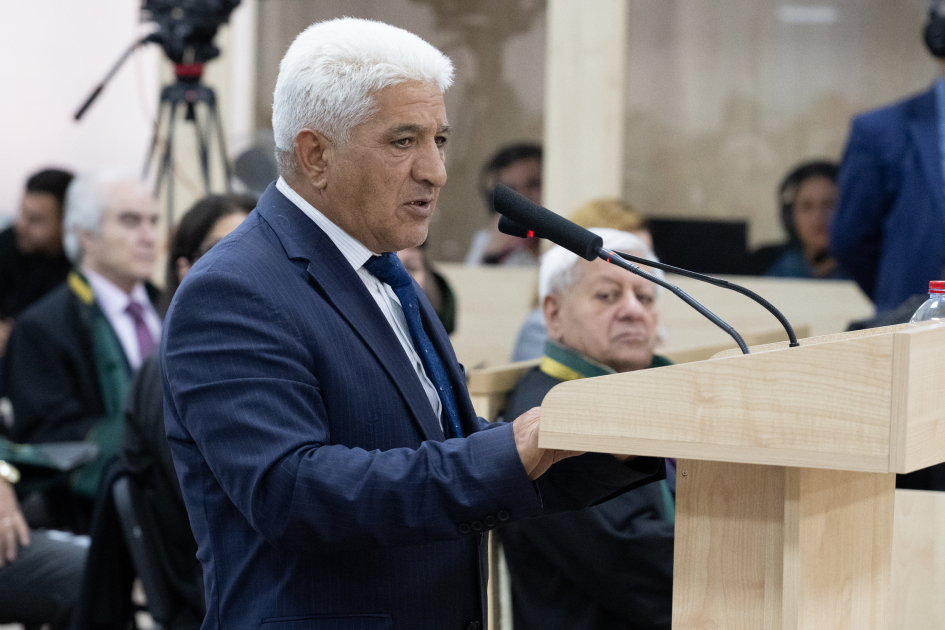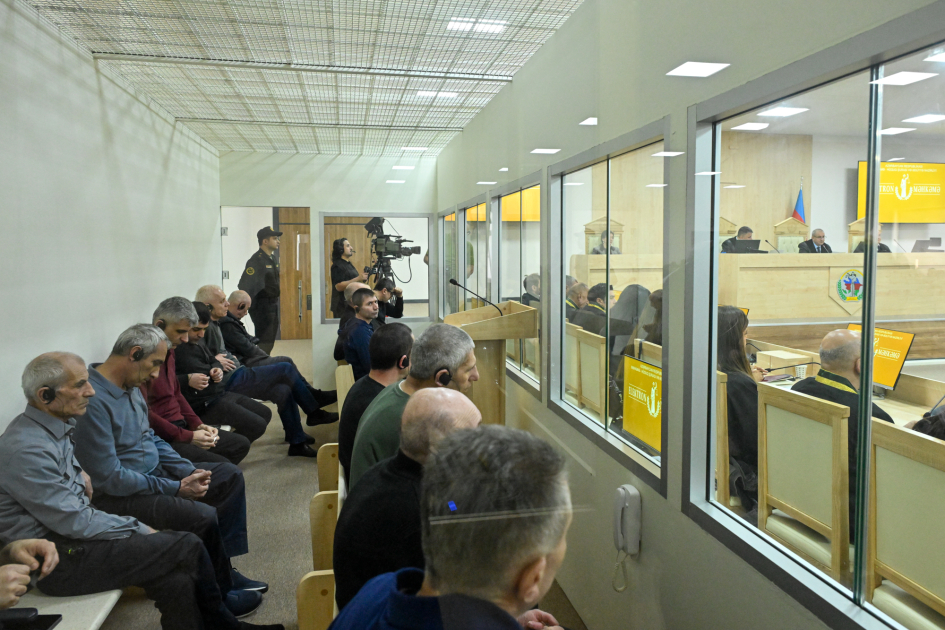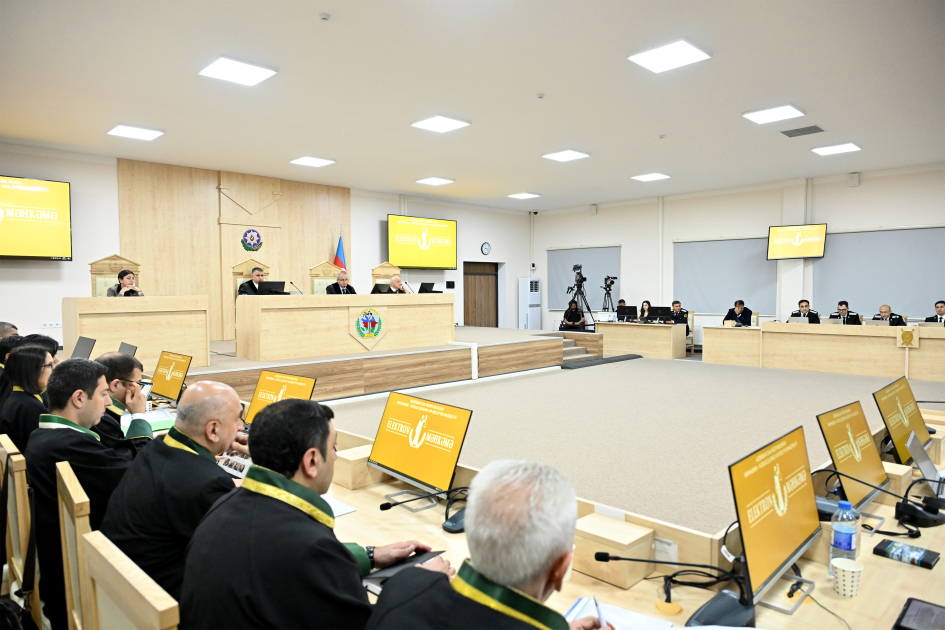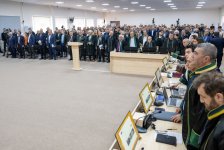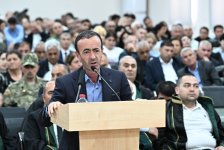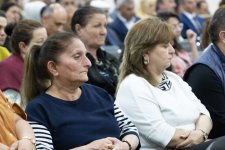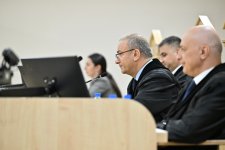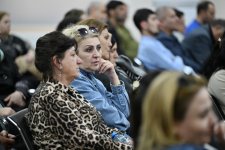BAKU, Azerbaijan, May 12. Public hearings on the criminal case against citizens of the Republic of Armenia Arayik Harutyunyan, Arkadi Ghukasyan, Bako Sahakyan, Davit Ishkhanyan, Davit Babayan, Levon Mnatsakanyan and others, who are accused of committing crimes against peace and humanity, war crimes, including the preparation and conduct of a war of aggression, acts of genocide, violation of the laws and customs of warfare, as well as terrorism, financing of terrorism, forcible seizure of power, forcible retention of power and numerous other crimes as a result of Armenia's military aggression, continued on May 12, Trend reports.
The hearings held at the Baku Military Court were presided over by Judge Zeynal Aghayev and a panel consisting of Jamal Ramazanov and Anar Rzayev (reserve judge Gunel Samadova). Each of the accused was provided with an interpreter into the language of their choice, as well as defense attorneys.
Present at the hearings were the accused and their defense attorneys, some of the victims, their legal successors and representatives, as well as prosecutors in charge of public prosecution.
Judge Zeynal Aghayev introduced the panel of judges, interpreters, etc. to those of the victims who were participating in the hearings for the first time, and also explained their rights and obligations stipulated by national legislation.
The public hearings heard tesimonies regarding massacres committed by Armenian armed forces against Azerbaijani residents in the Kalbajar district, including the village of Bashlibel in the district, as part of Armenia’s policy of occupation.
In his testimony regarding the extermination of the population of the Bashlibel village of Kalbajar district, Victim Elshad Alishov said that he, along with his family members and relatives had no choice but to leave the village via tunnel, following the occupation of Kalbajar district.
In response to a question from Senior Assistant to the Prosecutor General Vusal Aliyev, the victim said that he had no weapons for defense, and one of the bullets fired by the Armenian army during the incident hit his mother in the leg. “Armenians have besieged the tunnel, firing every vehicle passing through it,” he said. The victim noted that his mother was wounded in her leg, with his sister sustaining mouth wounds.
He noted that he had managed to save his mother, but was unable to get the rest of the relatives out of the tunnel.
Alishov added that his neighbor Yusif, together with his family members were also injured, with Yusif’s brother killed as a result of the attack.
Another victim Elshad Azizov testified that he was shot in the arm during the Armenian armed forces’ attack on Bashlibel and reported that 12 people were killed as a result of the assault. He stated that Armenian troops looted villagers’ homes and seized their livestock.
Azizov explained that after the Armenian military surrounded Kalbajar from nearly all directions, civilians were forced to flee via the Murov mountain road. Those unable to escape took refuge in remote mountain villages and remained in Kalbajar until July. He emphasized that during the occupation, Armenian forces did not permit the civilian population to evacuate the village.
Azizov said that after 113 days hiding, they eventually managed to reach the Dashkasan district in secret. In response to a question from Nasir Bayramov, Head of the Department of Public Prosecution Defense of the Prosecutor General's Office, he noted that Armenian territorial claims to Kalbajar began as early as 1987–1988: "Armenians were forcing Azerbaijanis to leave their homes. Before Kalbajar was occupied, many tragedies had already occurred in the district. Bashlibel alone had over 1,500 residents before the occupation."
Answering a question from Public Prosecutor Tarana Mammadova, Azizov stated that when Kalbajar was occupied, Armenian forces surrounded the civilian population from all four directions: “The goal was to eliminate the population. Civilians were not allowed to leave. The only possible escape route was the Murov mountain pass.”
In his testimony, Victim Habil Alasgarov stated that on April 5, they heard gunfire in Bashlibel. “Armenian troops looted homes and stormed the village. We hid in caves for safety, but once they discovered our hiding place, they started shooting. They threw tear gas into the caves, forcing us out. When I emerged and said everyone inside was already dead, they didn’t believe me and ordered me to bring the others out,” he testified.
Alasgarov detailed the vicious assault, claiming that when his mother, was shot in the arm. “Most of the people with us were elderly and women. The Armenians killed civilians on sight without asking any questions. There were even mercenaries from foreign countries. I got away and lived. They burned an old man alive in the cultural center—only his head remained. A woman was thrown into water and left to freeze. They even killed animals without mercy,” he recounted.
In response to a question from Tuqay Rahimli, Assistant to the Prosecutor General for Special Assignments, Habil Alasgarov, explained that the only exit from Bashlibel was via a road known as "the Tunnel." However, the Armenian army had set up an ambush there and blocked it. With no forests nearby to offer cover, people sought shelter in local caves, where they were left without food or water for days. He described the extreme conditions: total darkness, hunger, and the constant threat of death. Survivors had to choose between starving in the caves or risking their lives to sneak back into the village at night in search of food.
Then the state prosecutors presented drone footage of the caves where the villagers had taken refuge. Victims identified the exact locations they had used for hiding.
When asked which directions the Armenian army had launched attacks from, Alasgarov responded that they came from Aghdaban and Basarkechar.
Another victim, Tajira Alasgarova, testified that she sustained a gunshot wound to her left arm during the attack on April 18. Alasgarova was separated from her family for eight days.
In response to a question from public prosecutor Vusal Abdullayev, she said they had lived in the caves for 113 days in freezing conditions, without food or water. “It was like living in hell,” she said.
A witness, Adalat Abbasov, also testified, stating that in April 1993, while they were hiding in caves, Armenian soldiers brutally killed the remaining residents of Bashlibel.
“A resident named Huseyn was burned by pouring fuel on him inside the village’s cultural center. We saw the bodies when we snuck into the village to look for food,” he said.
A. Abbasov further mentioned that on April 18, 1993, nearly 30 armed soldiers of the Armenian army approached the caves where they were and killed 10 residents of Bashlibel village, a resident of Lachin district named Ahliman, and his serviceman Vugar Abdullayev.
In response to the questions of public prosecutor Fuad Musayev, “When did you reach the caves?” and “how many people were there?”, the victim stated: “We sought shelter in the caves on April 5 and stayed there. There were 7-8 caves, with each of them housing about 10 people.”
Victim Rustam Alasgarov testified that they saw the body of a resident named Ganaet on the side of the road in Bashlibel, adding that the Armenian army units were subjecting people to all kinds of torture.
“Among those killed by the Armenian army were elderly people, children, and in general, civilians,” he further mentioned.
In response to questions from the representatives of the victims, R. Alasgarov said that there were mercenaries from foreign countries among the attackers. “Some of the hostages were later exchanged. Those people were subjected to terrible torture while being held hostage,” he added.
Victim Ali Zeynalov noted that they were ambushed by the Armenian army in a place called “Tunnel,” adding that he lost his relatives during that incident.
“Armenian armed forces shot the elderly, women, and children without sparing anyone,” he underscored.
In response to questions from Senior Assistant to the Prosecutor General Vusal Aliyev, A. Zeynalov mentioned that they were able to leave Kalbajar from the Murov direction for two days.
In his testimony, victim Arif Suleymanov said that on April 1, he wanted to pass over the Murov Mountain on foot to go to Kalbajar to help his besieged family members, but he could not go since the area was occupied by the Armenian armed forces along the Tartar River.
“Therefore, we were forced to return from the area of Yanshak village. The day before, the Armenian army shot down the last helicopter that took off from Kalbajar. The Armenian armed forces took positions in the area called “Tunnel” to ambush Azerbaijanis and shooting all the cars trying to pass the tunnel. Therefore, people were forced to head towards Murov. Frosty and snowy weather made it hard to travel on that road. The vast majority of the population who left the village could not move forward since they were elderly,” he added.
“I lost my mother during the occupation of Bashlibel village,” the victim added.
The next hearings are scheduled for May 15.
A total of 15 Armenian nationals are being charged with numerous crimes involving direct leadership and participation of the Armenian state, its state bodies, military forces and illegal armed formations, verbal and written instructions, orders and assignments, provision of material and technical support, central governance, as well as the exercise of rigorous control, with the aim of committing military aggression and acts of terror against the Republic of Azerbaijan in the territory of Azerbaijan in violation of domestic and international law, and involving Robert Sedraki Kocharyan, Serzh Azati Sargsyan, Vazgen Mikaeli Manukyan, Vazgen Zaveni Sargsyan, Samvel Andraniki Babayan, Vitali Mikaeli Balasanyan, Zori Hayki Balayan, Seyran Mushegi Ohanyan, Arshavir Surenovich Garamyan, Monte Charles Melkonyan and others, including criminal acts committed during the course of the war of aggression waged by the aforementioned criminal group.
The said persons, i.e. Arayik Vladimiri Harutyunyan, Arkadi Arshaviri Ghukasyan, Bako Sahaki Sahakyan, Davit Rubeni Ishkhanyan, David Azatini Manukyan, Davit Klimi Babayan, Levon Henrikovich Mnatsakanyan, Vasili Ivani Beglaryan, Erik Roberti Ghazaryan, Davit Nelsoni Allahverdiyan, Gurgen Homeri Stepanyan, Levon Romiki Balayan, Madat Arakelovich Babayan, Garik Grigori Martirosyan, Melikset Vladimiri Pashayan, are being charged under Articles 100 (planning, preparing, initiating and waging a war of aggression), 102 (attacking persons or organizations enjoying international protection), 103 (genocide), 105 (extermination of the population), 106 (enslaving), 107 (deportation or forced displacement of the population), 109 (persecution), 110 (enforced disappearance of people), 112 (deprivation of liberty contrary to international law), 113 (torture), 114 (mercenary service), 115 (violation of the laws and customs of warfare), 116 (violation of international humanitarian law during armed conflict), 118 (military robbery), 120 (intentional murder), 192 (illegal entrepreneurship), 214 (terrorism), 214-1 (financing terrorism), 218 (creation of a criminal association (organization)), 228 (illegal acquisition, transfer, sale, storage, transportation and possession of weapons, their components, ammunition, explosives and devices), 270-1 (acts threatening aviation security), 277 (assassination of a state official or public figure), 278 (forcible seizure and retention of power, forcible change of the constitutional structure of the state), 279 (creation of armed formations and groups not provided for by law) and other articles of the Criminal Code of the Republic of Azerbaijan.

